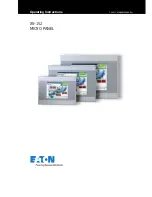
5
FIGURE 1. USE SOLDERING IRON TO PRY LEADS
◆
IC Removal/Replacement
Some utilized chassis circuit boards have slotted (oblong) holes through which the IC leads are inserted
and then bent flat against the circuit foil. When holes are slotted, the following technique should be used
to remove and replace the IC. When working with boards using the familiar round hole, use the standard
technique as outlined in paragraphs 5 on the page under the title of general soldering guidelines.
◆
Removal
1. Desolder and straighten each IC lead in one operation by gently prying up on the lead with the
soldering iron tip as the solder melts.
2. Draw away the melted solder with an anti-static suction-type solder removal device (or with
desoldering braid before removing the IC.
◆
Replacement
1. Carefully insert the replacement IC in the circuit board.
2. Carefully bend each IC lead against the circuit foil pad and solder it.
3. Clean the soldered areas with a small wire-bristle brush. (lt is not necessary to reapply acrylic coating
to the area).
◆
“Small-Signal” Discrete Transistor Removal/Replacement
1. Remove the defective transistor by clipping its leads as close as possible to the component body.
2. Bend the ends of each of three leads remaining on the circuit board into a “U” shape.
3. Bend the replacement transistor leads into a “U” shape.
4. Connect the replacement transistor leads to the corresponding leads extending from the circuit board
and crimp the “U” with long nose pliers to ensure metal-to-metal contact, then solder each connection.
Содержание 531X
Страница 32: ...PCB LAYOUT 30 Main PCB Component Side...
Страница 33: ...31 Main PCB Solder Side...
Страница 34: ...32 CRT PCB Component Side CRT PCB Solder Side...
Страница 35: ...33 SCHEMATIC DIAGRAM Power Connection Section...
Страница 36: ...34 Control Vert out Section...
Страница 37: ...35 Horizontal Section...
Страница 38: ...36 Video Section...
Страница 39: ...EXPLODED VIEW DIAGRAM 37...








































